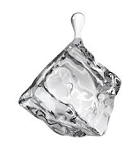I saw a headline the other day about a "market melt up." That made me scroll back to see what the heck they were talking about, because that was new to me.
Sure enough: there's such a thing in finance as a melt up, which an article in Bloomberg defines as "a sharp and unexpected gain driven by a stampede of investors who don’t want to miss out rather than [by] any fundamental improvements." When the market rises due to a kind of financial FOMO.
 There are some interesting aspects to the term melt up. It seems safe to assume that it's based on the term meltdown, in which things are, broadly speaking, going to hell. The metaphor of meltdown at least has the image correct; when something melts, gravity tends to cause the liquid to flow downward. Many things can melt down: the Arctic; nuclear fuel cores; people under stress. (I can't offhand think of a use for meltdown when it's considered a positive, but let me know if I've overlooked one.)
There are some interesting aspects to the term melt up. It seems safe to assume that it's based on the term meltdown, in which things are, broadly speaking, going to hell. The metaphor of meltdown at least has the image correct; when something melts, gravity tends to cause the liquid to flow downward. Many things can melt down: the Arctic; nuclear fuel cores; people under stress. (I can't offhand think of a use for meltdown when it's considered a positive, but let me know if I've overlooked one.)
So a melt up is sort of the opposite of a meltdown, right? Yes and no. The up part is an opposite; prices are going up. But if a meltdown is definitely a bad thing, a melt up is not necessarily a good thing. (It's temporarily positive, but the expectation is that prices are going up for the wrong reasons. As the Investopedia article says, "Melt ups often precede melt downs.") Most of all, the melt metaphor, while tying the idea to that of a meltdown, sort of doesn't make sense in melt up.
Finally, I wondered what the difference is, financially speaking, between a melt up and a bubble. Bloomberg makes the distinction that a melt up might end up being justified by market fundamentals, whereas a bubble by definition is when prices are no longer realistic. As I understand it.
This would all just be just lexical fun if the potential consequences of market melt ups were not so dire. So let's hope that we will not, in fact, be hearing this term much in the future.
On to origins. Last weekend, the grandboy surprised (and amused) us by telling us that there was "just a titch" of water left in his glass. It's apparent that he got this expression from his mother, who is a Pacific Northwest native, with some linguistic influence from family in Texas. And of course I immediately wondered where titch had come from.
 If you look up titch in the dictionary, you find that there's a word titchy in British English, which means "very small, tiny." Perhaps surprisingly, the word titchy is an eponym; there was an actor whose stage name was Little Tich, who was small. Some people trace titch meaning "small quantity" back to this origin. Nancy Friedman has a writeup of this explanation on her blog (via the site World Wide Words), which notes that titch is British and Australian slang.
If you look up titch in the dictionary, you find that there's a word titchy in British English, which means "very small, tiny." Perhaps surprisingly, the word titchy is an eponym; there was an actor whose stage name was Little Tich, who was small. Some people trace titch meaning "small quantity" back to this origin. Nancy Friedman has a writeup of this explanation on her blog (via the site World Wide Words), which notes that titch is British and Australian slang.
I also had a peek in the Dictionary of American Regional English (aka DARE), but it doesn't seem to have an entry for titch. When I poked around on various online forums, people from places like Iowa and central Canada likewise wondered about the term. (A Canadian fashion blogger has a blog named Just a Titch.)
You might wonder how some British slang based on an 19th-century actor managed to make its way to the western US and Canada and become established in the vernacular there. And the answer is … probably it didn't. Per the OED, titch is a variation of touch ("just a touch" to mean "just a small quantity"). Well, darn; if the OED is to be believed, British titchy is unrelated to "just a titch."
Of course, none of this decreases our enjoyment of hearing the kid pick up idiomatic expressions, which also of course will keep me reaching for the dictionary.
Like this? Read all the Friday words.
 |
|

 |
|
